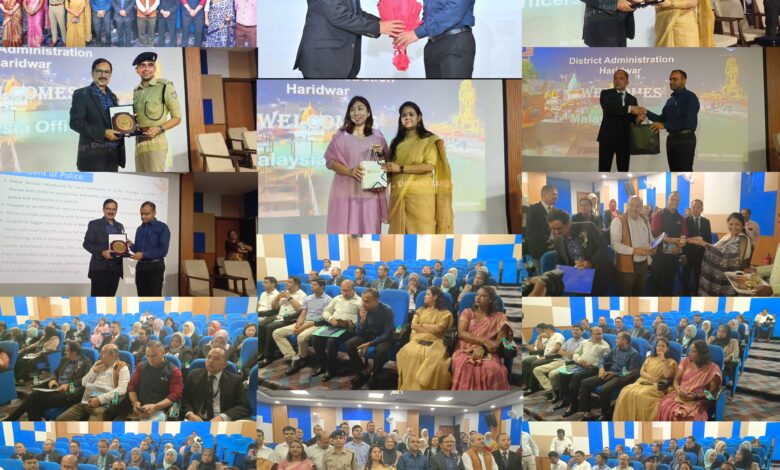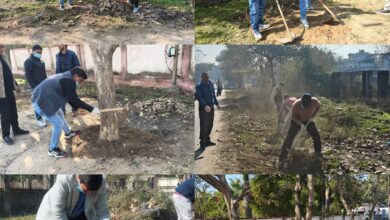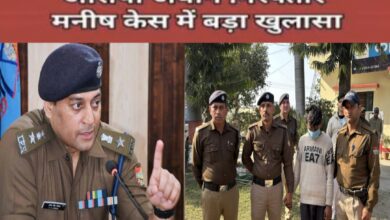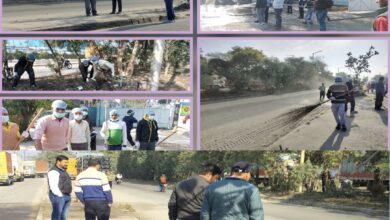Warm Welcome for Malaysian Civil Service Officers in Haridwar Orientation on Governance, Welfare Schemes, and Law & Order Cultural Heritage and Administrative Practices Showcased

Intzar Raza Journalist Haridwar 8909868566…
– Warm Welcome for Malaysian Civil Service Officers in Haridwar
Orientation on Governance, Welfare Schemes, and Law & Order
Cultural Heritage and Administrative Practices Showcased
Haridwar, August 12, 2025 – A delegation of 32 civil officers from the Malaysian Civil Service arrived in Haridwar under the aegis of the National Centre for Good Governance (NCGG), Government of India, as part of their study tour aimed at understanding India’s administrative systems, development initiatives, and cultural ethos. The visit was coordinated by Course Coordinator & Faculty Member Dr. Sanjeev Sharma, Coordinator Dr. B. S. Bisht, and Training Associate Brijesh Bisht.
The trainees were accorded a traditional ceremonial welcome at the Vikas Bhawan (District Development Office) by District Magistrate (DM) Mayur Dikshit, Chief Development Officer (CDO) Akanksha Konde, and senior district administration officials, who presented them with flower bouquets and sacred Ganga water.
An Insight into Indian Governance and Administrative Responsibilities
Addressing the visiting officers in the Vikas Bhawan Convention Hall, DM Mayur Dikshit extended a warm welcome to the Malaysian delegation, congratulating them on their selection into the Malaysian Civil Service and wishing them a bright professional future.
In his keynote session, the DM elaborated on administrative duties, powers, and responsibilities at the district level, explaining how the Indian administrative framework operates under both Central and State Government mandates. He highlighted the range of public welfare schemes implemented through various departments, their monitoring mechanisms, and the role of district officers in ensuring last-mile delivery of benefits to eligible citizens.
The DM also offered a detailed account of Haridwar’s unique administrative challenges, including:
- Religious and cultural significance of the city, home to the iconic Ganga Aarti, Kumbh Mela, and Kanwar Yatra.
- Crowd management strategies during massive pilgrimages and festivals, which often witness millions of visitors.
- Disaster management preparedness in a region prone to heavy monsoon rains, flash floods, and other emergencies.
- Infrastructure requirements and inter-departmental coordination essential for smooth governance.
Development Planning from the Grassroots
Following the DM’s address, CDO Akanksha Konde spoke about development schemes being implemented across Haridwar district, focusing on how projects are designed, executed, and monitored to reach village-level beneficiaries. She explained the mechanisms that ensure transparency and accountability in public spending, and how departments work together to improve rural infrastructure, health, education, and livelihood opportunities.
Block Development Officer (BDO) Bahadrabad, Manas Mittal, provided an in-depth briefing on block-level schemes, detailing the flow of funds, implementation through departmental coordination, and the role of Panchayati Raj Institutions in facilitating participatory governance.
Policing, Law Enforcement, and Event Management
Superintendent of Police (SP) Jitendra Chaudhary delivered an insightful presentation on law enforcement structures, police hierarchy, and the operational framework for maintaining peace and order. He shared Haridwar Police’s real-world experiences in managing large religious gatherings like the Kumbh Mela and Kanwar Yatra—events that require advanced crowd control techniques, surveillance systems, and emergency response planning.
The SP also discussed the legal framework guiding police operations, coordination with civil administration, and measures taken to ensure citizen safety during peak tourist seasons.
Interactive Session with Malaysian Officers
The Malaysian delegation actively participated in the proceedings, posing questions on governance models, disaster preparedness, and event management strategies. The Indian officials responded with detailed examples, offering comparative insights into administrative practices in both countries.
The team leader, Mohd Khairull Rizall bin Yahya, Deputy Director, Fire and Rescue Department of Malaysia, Federal Territory of Putrajaya, expressed deep appreciation for the structured approach and openness of the Haridwar administration in sharing practical experiences. Brijesh Bisht, Associate Professor and member of the visiting faculty, echoed the sentiment, calling the interaction “an invaluable exposure to India’s governance at the grassroots and district levels.”
At the conclusion of the programme, the Malaysian team presented mementoes to the DM, CDO, and SP as a token of gratitude.
Programme Coordination and Attendance
The event was expertly conducted by District Economics & Statistics Officer, Nalini Dhyani, who ensured smooth proceedings throughout the training session.
Several senior officials from Haridwar district administration were present, including:
- Chief Medical Officer Dr. R. K. Singh
- Sub-Divisional Magistrate (SDM) Jitendra Kumar
- Project Director K. N. Tiwari
- District Development Officer Ved Prakash
- District Programme Officer (Child Development) Sulekha Sehgal
- Disaster Management Officer Meera Rawat
- Tehsildar Sachin Kumar
- District Manager Abhishek Chauhan
Their presence underscored the inter-departmental nature of the briefing, providing the visiting officers with a holistic perspective of district governance.
A Bridge Between Administrative Cultures
The visit served as an important knowledge-sharing platform between the Malaysian and Indian administrative services. While the Malaysian officers gained a first-hand understanding of the scale and diversity of governance in India—particularly in a district as unique as Haridwar—the Indian hosts benefited from the opportunity to compare systems and exchange innovative practices.
Haridwar’s combination of religious tourism, cultural heritage, and complex governance challenges offered a living case study for the trainees. From policy implementation to crisis management, the sessions gave them a comprehensive view of how public administration operates in a high-profile district.
The warmth of the welcome, the depth of information shared, and the spirit of cooperation ensured that this interaction would remain a memorable and educational milestone for both sides.
Quote – DM Mayur Dikshit:
“It is an honour to host our Malaysian counterparts in Haridwar. We believe in learning from each other’s experiences, and such exchanges strengthen the bond between nations while improving governance practices.”
Quote – Faezah Rabani, Malaysian Trainee Officer:
“The scale of public administration here is remarkable. The way Haridwar manages millions of visitors during events is a lesson in planning and discipline.”
Quote – Dr. B. S. Bisht, Associate Professor:
“These visits are more than academic exercises; they are opportunities to understand governance in action and to build professional linkages that last a lifetime.”






